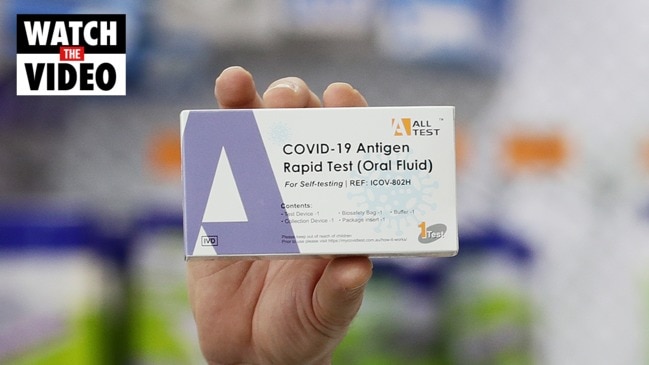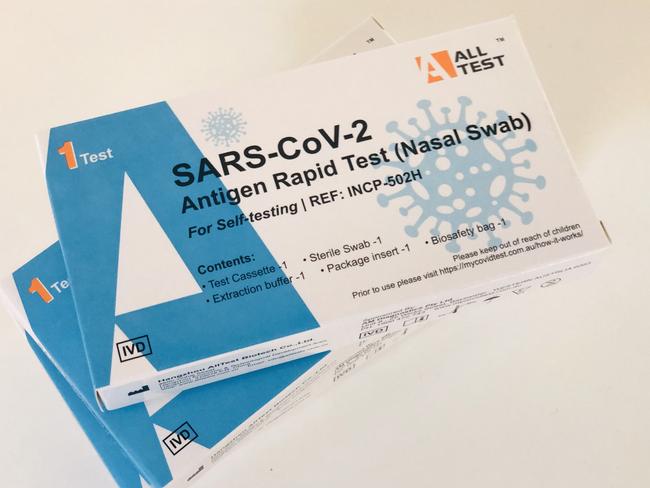Covid expenses you can (and can’t) claim on your tax return
The pandemic has drummed up a whole bunch of new expenses for workers. See what you can claim and how to go about it.

SmartDaily
Don't miss out on the headlines from SmartDaily. Followed categories will be added to My News.
If you are one of the lucky people who got their hands on a packet of RATs, keep the receipt because they may be tax deductible.
The same goes for travel costs if you recently spent hours lining up at a drive-through PCR test clinic, and for N95 masks if you are required to cover your face at work.
While one-off Covid expenses may seem negligible on their own, after two years of purchasing sanitiser and gloves, the costs begin to add up.
H&R Block director of tax communications Mark Chapman says there are lots of Covid-related expenses that can be claimed by workers as part of their tax refund.
WHAT YOU CAN CLAIM
Gloves, face masks, sanitiser and antibacterial wipes can all potentially be claimed as work expenses if you are in an occupation with customer-facing contact, according to Chapman.
“That could include people working in healthcare, retail, hospitality, teaching, beauty and hairdressing,” he says.
“With face masks and so on, it’s a case of do you feel secure? Is it likely you need one of those items to fulfil your duties? That’s what makes it deductible.”

Chapman says expenses related to Covid tests can also be claimed as long as your employer told you to get the test.
“It needs to be at the employer’s instigation,” he says.
“If you are obliged to get a PCR test, absolutely any cost associated with that, such as travel expenses will be deductible.”
Chapman says anyone who had to quarantine while travelling interstate for work may also have expenses they can claim.
“That counts as work-related travel so any expenses associated with quarantine are deductible,” he says.
“If you are quarantining for some private purpose – for example, returning to work after a holiday – that is not deductible.
“Generally, workers would get their employer to cover quarantine costs but in the current climate a lot of employers are not prepared to put their hand in their pocket for that kind of thing so it’s important to know you may be able to claim a tax deduction if it is part of your job.”

HOW TO DO IT
If you intend to claim a Covid-related expense at tax time, you will need proof of the cost incurred.
While you won’t have to submit this with your tax forms, you must be able to produce evidence if you are asked by the Australian Taxation Office.
“You have always got to keep substantiation,” Chapman says.
“In this case it would be a receipt or invoice to prove you did incur the expense.
“But if you are reimbursed by your employer, you can’t claim the tax deduction – it needs to be out of your own pocket.”
When claiming travel expenses related to Covid, you can use the cents per kilometre method.
The tax office stipulates a rate of 72 cents per kilometre for a maximum of 5000 business kilometres for the 2020–21 income year.
This rate incorporates decline in value, registration, insurance, maintenance, repairs and fuel costs.
You can’t add these expenses on top of the rate when you work out your deduction.
You may need to provide written evidence to show how you worked out your business kilometres – for example, diary records of work-related trips or by using the ATO app to track your trips.

Sydney’s Veronica Yordanova has not had to claim any Covid-related expenses on her tax return as they have all been covered by her employer.
She is an employee experience partner at software company Qualtrics, which helps organisations design and deliver improved experiences for customers and employees.
“When working from the office, you have easy access to things like hand sanitiser and face masks – even rapid antigen tests for interstate travellers – which makes you feel more confident in these environments,” Yordanova says.
As well as providing personal protective equipment, Qualtrics also covered the set up of home offices so staff could work effectively during lockdowns.
Each employee was last year given up to $965 to purchase items such as monitors and desk chairs.
More Coverage
Originally published as Covid expenses you can (and can’t) claim on your tax return




